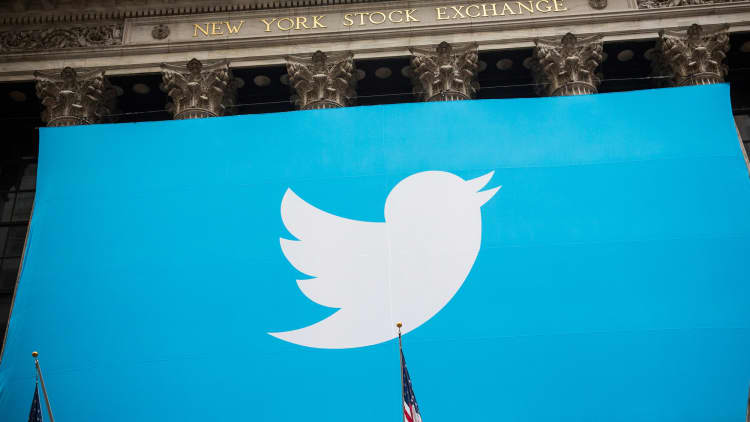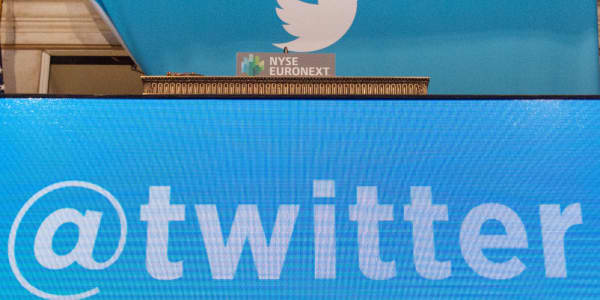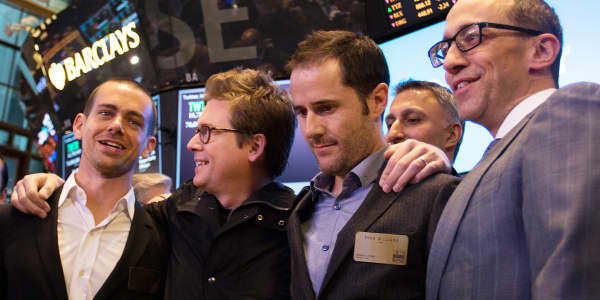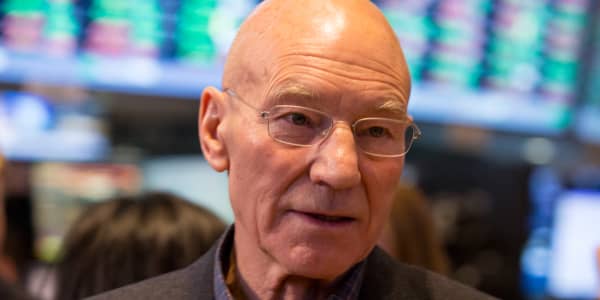
Twitter chief executive Dick Costolo said the company felt comfortable boosting its initial public offering price because of the "enthusiasm" he's seen on the road.
Twitter priced its IPO at $26 per share on Wednesday, above the original expected range of $23 to $25 per share; with 70 million shares to be issued the company will raise $1.8 billion and be valued at $18.3 billion, fully diluted.
One of the most exciting things about the road show, Costolo told CNBC was how familiar potential investors were with Twitter, giving him "examples of how Twitter has been so powerful."
"That enthusiasm from investors and their own use of the product, both from a user basis, and then from the potential of it as a monetization platform has been fantastic to see."
(Read more: Five memorable tech IPO moments)
Costolo added that he had no regrets about the IPO process, noting it was "enormously helpful" that the new regulations of the Jumpstart Our Business Startups Act enacted in late 2012 allowed the company to file confidentially.
"It allowed us to be thoughtful and patient with the time that we spent during that filing process. We were working on it for months, of course, before we made it public," he said.
Costolo dodged questions about whether Facebook's IPO debacle affected his strategy, noting he drew on the experience of a range of Silicon Valley companies.

Prospects for profits
Costolo said investors should not be concerned about Twitter's current lack of profits—it's part of the company's plan to invest for the long term. The Twitter CEO was very clear that he sees significant margins down the road: "There's nothing structural about Twitter that prevents us from having the kind of margin profiles of our peer group. We are investing for the long term. We think this is a long-term company—a company for which there is a fantastic use case for every person on the planet."
The company is currently investing in improving its platform, its ads and growth. Costolo said that since the company's ads work, one of its biggest challenges is getting more people hooked, to "bridge that gap between massive global awareness and quick engagement on the platform. That's thinking about things we can do during the sign-up process to make it easier to get the product right away. It's the photo-forward, media-forward capabilities we've launched in the product very very recently."
(Read more: Twitter's future—beyond ads, here's what's next)
Twitter's future
While Twitter's future will certainly rely on its current bread-and-butter, Costolo is already making partnerships and branching out to drive the next leg of the company's growth. TV deals are a huge part of that: "We are helping broadcasters and content partners A) drive tune-in and discover in advance of the show, B) and extremely importantly, being the place for live reach during a show," he said.
"Twitter has become the second screen for conversation about that show while it's happening. Being able to help broadcasters and content partners aggregate that attention on Twitter during the show and engaging that live reach is a super-powerful capability for our broadcast partners."
And that's a win for Twitter, because the more useful it is to broadcast partners or advertisers, the more money they'll spend on the platform.
Another big area for growth is retail. Costolo stressed repeatedly that the hire of former Ticketmaster CEO Nathan Hubbard as Twitter's new commerce chief indicates the company's confidence in an entirely new revenue stream. "There's already commerce happening on Twitter every day," Costolo said. "When you think about the company we're building, this indispensable companion to life in the moment, there are all sorts of in-the-moment capabilities."
(Read more: Twitter's ambitions: #ChangeWorld #MakeMoney)

Deflecting concerns
What about competition from Facebook and others? Costolo wouldn't even mention the social behemoth when answering the question about Facebook increasingly getting into Twitter's territory. However, he did say that what makes Twitter unique is its "public, real-time" conversation. "We are the only platform that is all of those at scale."
There are also concerns that Twitter has gotten too crowded with junk, that it has a "signal to noise problem," as Ashton Kutcher put it. Costolo just extolled the virtues of the 140 character format. "The beauty of the 140 characters is that it facilitates this in-the-moment consumption and the ability to scan a significant amount of content quickly."
What Costolo is focused on is now to encourage "the designers and the engineers and the product managers to create bold and courageous innovations and hypotheses that we can go test out in the market."
—By CNBC's Julia Boorstin. Follow her on Twitter: @JBoorstin.





